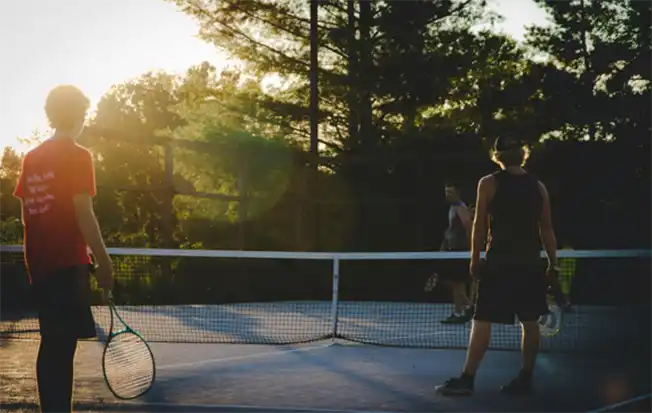Often referred to as a “game of life,” tennis provides far more than just a fun activity. Tennis is a gateway to bettering physical and mental health for students, regardless of their level of experience. But exactly how does it support your general well-being? Let’s start and investigate the great advantages tennis offers for students.
Physical Benefits of Playing Tennis
Tennis is a full-body exercise presented as leisure. Every swing, dash, and serve targets different muscle areas, so providing trainees with a comprehensive approach to fitness. Tennis calls for rapid movement across the court, racket swing, and accurate ball strike. Over time, these exercises strengthen your upper and lower body muscles. Moreover, the game’s quick tempo improves your cardiovascular endurance, thereby enabling you to survive longer in sports other than tennis. Tennis tests your ability to respond fast to movements of your opponent. As you real-time modify your posture and motions, this increases hand-eye coordination and general agility.
These abilities can be applied by students to different sports and even daily activities like multitasking or avoiding hurdles. Tennis is a great calorie burning sport since it requires continuous motion. Depending on degree of activity, a one-hour exercise can burn 600 calories. Tennis offers a pleasant, sustainable approach for students trying to either keep or lose weight to keep active.
Tennis as a Social Entertainment
People are sociable animals, thus tennis has lots of chances for socializing. Tennis builds relationships whether you are rallying with a friend or playing a doubles match.
Promotes communication and teamwork.
Playing doubles helps students—especially younger ones—learners understand the value of cooperation and communication. You have to coordinate your movements and rely on your partner to develop collaboration qualities applicable both on and off the court. Participating in lessons or a neighborhood tennis club exposes you to like-minded people. From their friends, students often receive inspiration and support, which makes tennis not only a game but a social event.
Boosts Academic Performance
Balancing academics and extracurricular activities can be challenging for students, but tennis teaches valuable time management skills. By dedicating time to practice and matches, learners become better at prioritizing their tasks, including completing assignments. For students struggling to keep up with their workload, help from https://papersowl.com/ can be a solution. Combining physical activity with effective study strategies ensures that students stay both mentally and academically fit.
Tennis’s mental health benefits
Apart from the obvious benefits, tennis provides a mental stimulation as well. Actually, its psychological and strategic elements make it a “brain sport” rather commonly. Ever felt like throwing aside your worries? Tennis offers a useful way to let pent-up tension out. After a game, students who combine physical effort with mental concentration forget their daily worries and come back relaxed. In tennis, every point calls both preparation and execution. For students, this approach improves cognitive abilities including decision-making, problem-solving, and under pressure concentration. Like solving a puzzle, but with a racket and a ball!

The Function of Tennis in Human Development
Tennis is about self-development not only about winning matches. Usually, the life lessons acquired on the court translate into personal success. Developing tennis calls for time, commitment, and a constant practicing attitude. For students, this road develops discipline and patience—qualities quite helpful in reaching long-term objectives in any sphere of life. Every effective serve or point earned increases confidence. Students grow to feel successful over time that transcends tennis, therefore raising their self-esteem in many spheres of life.
Tennis as a lifetime activity
Tennis is one of the easiest accessibility among sports. The game is something anyone can enjoy, thus it’s a lifetime sport. Tennis may be adjusted to your speed unlike some games that call for maximum physical ability. As their skills develop, students might start with leisurely rallies and advance to more competitive games. Regular tennis helps students to develop a better way of living. From improved diet to staying hydrated and active, the habits developed around the sport improve general well-being.
How to Begin Your Tennis Adventure
- Starting tennis is less difficult than you might expect. These pointers are for students:
- Invest in good equipment; a comfortable racket and appropriate shoes will have a big impact.
- Enrol in beginners’ friendly courses to pick the foundations.
- Practice Often: Improvement requires consistency.
- Attend a Club: Participating in a tennis community keeps you inspired.
Conclusion
Tennis is a road toward improved physical and mental health, social contacts and personal development – not only a game. Tennis has something for everyone whether your goals are new people, de-stress or fitness. For students, the path starts with a single serve but yields lifetime advantages. Why then not grab a racquet and pound the court? Your body and mind will be grateful.















